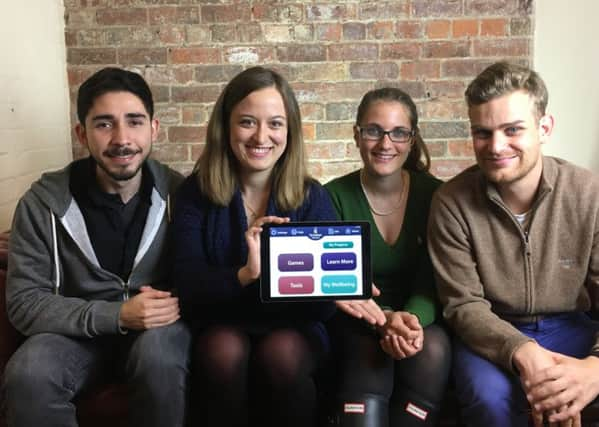Four Scottish tech firms to watch over the next 12 months


Since it was launched in 2008, EIE – which is run by Informatics Ventures, a support programme for Scotland’s technology entrepreneurs – has helped companies to raise £350 million, with 60 early-stage businesses pitching for funding at EIE16.
The dust may have only just settled on this year’s [2016’s] event, but already organisers are looking forward to next year’s [2017’s] EIE, which will take place at the Edinburgh International Conference Centre (EICC) on the 10th and 11th May.
Advertisement
Hide AdAdvertisement
Hide AdSteve Ewing, EIE17 programme lead at Informatics Ventures, said: “EIE started off in Appleton Tower at the University of Edinburgh with just 14 companies and around 50 attendees, but it quickly out-grew the tower and now it’s out-grown the Assembly Rooms too.


“Next year’s event will be bigger, bolder and will go beyond what we’ve done before – we will have towards a thousand people, many of whom will be investors, coming to Edinburgh to see 60 of the best companies in the tech sector pitching for funding.
“We’ll also be introducing a ‘start-up alley’ so earlier-stage businesses can meet investors, and we’ll have a Scottish food and design expo too.”
Sir Michael Moritz, chairman of Silicon Valley venture capitalist Sequoia who invested in Edinburgh-based travel search site Skyscanner in 2013, will be one of the keynote speakers at the event.
While pitchers and investors patiently wait for EIE17, which companies are going to be the stars of the next 12 months in Scotland’s tech ecosystem?


Luke Johnson was head of geo-modelling technology at German oil and gas giant Wintershall when he spotted a gap in the market.
He was looking for technology that the company could use to give it an edge in exploration and production but, when he couldn’t find the right innovations, he saw an opportunity.
Johnson founded Cognitive Geology with his wife, Fiona, in April 2014 and already their company has grown to include 12 staff in Edinburgh, London and Houston in Texas.
Advertisement
Hide AdAdvertisement
Hide Ad“There are a lot of rules of thumb that experienced geologists use when they’re looking at data,” explained Johnson.
“Those rules of thumb are built into our software, so it allows anyone to use that expertise.”
The company is talking to major industry players including Chevron, Shell and Statoil and plans to launch its software for beta testing before the end of the year.
Cognitive Geology is expected to raise between £1 million and £3m in Series A funding over the summer and is already planning for Series B investment of between £20m and £50m.
The cash will allow the company to acquire other software businesses and quickly build a company of scale.
“You need to have scale to work in the oil and gas industry otherwise you just get swallowed up,” Johnson said.
“We’ve also joined the London Stock Exchange’s ELITE programme in preparation for floating the company on the Alternative Investment Market (AIM), which I expect could happen as early as 2018.”
One of the biggest problems that surgeons face when removing cancer from the body is to make sure that they take away the whole tumour – if any is left behind then the cancer can return.
Advertisement
Hide AdAdvertisement
Hide AdEdinburgh Molecular Imaging, a spin-out company from the University of Edinburgh, has developed “smart” markers that make the cancer “light-up” so surgeons can see everything that they need to remove.
“These are ‘molecular lightbulbs’ – they make the invisible visible,” said chief executive Ian Wilson.
The company’s markers are made from molecules that target processes going on in the cancer and from florescent dyes that the surgeons can then see.
Its lead candidate, a colorectal cancer drug, is preparing to enter Phase II-b clinical trials and, if Phase III is then successfully completed, it could be ready for use in 2019-20.
The molecular technology was developed by medics Kev Dhaliwal and Chris Haslett along with chemist Mark Bradley, initially for treating lung diseases, with Edinburgh-based venture capital fund Epidarex supplying Series A funding.
Edinburgh Molecular Imaging is now preparing to raise £15m in Series B funding to take its lead candidate to market.
“The size of the market is huge – there are 5,000 colonoscopies taking place in Edinburgh alone each year and 16 million a year in the United States,” Wilson added.
Founded by a group of four friends from Glasgow and Strathclyde universities, MindMate has developed a technology platform to help people with dementia – along with their families and carers – to manage their condition.
Advertisement
Hide AdAdvertisement
Hide AdThe company’s apps were inspired by co-founder and chief technology officer Rogelio Arellano, who cared for seven years for his grandfather, who had Alzheimer’s disease.
“Rogelio’s grandfather was a sharp man – he had worked as an engineer – and he was frustrated with his loss of memory,” said chief executive and co-founder Susanne Mitschke.
The business was launched in March 2015 and already has ten full-time members of staff.
MindMate raised £300,000 of seed funding in March, has 30,000 unique users a month and has reached second spot in the free health and fitness section of Apple’s app store, a hotly-contested category that also includes dieting, workout and yoga apps.
In July, the company will join an accelerator programme in the United States, after which it plans to raise $2m (£1.4m) of funding to fuel its expansion.
“Our app is a self-management tool – we don’t make any claims about it slowing down the onset of dementia,” Mitschke added.
“We’re working with NHS Glasgow and a student from the University of Glasgow is reviewing MindMate for her dissertation – that will start the process that we hope will eventually lead to clinical validation.”
While he was studying medicine at the University of Dundee, Chris McCann used the experience from his previous degree in computer science to come up with a way of helping to monitor patients.
Advertisement
Hide AdAdvertisement
Hide Ad“I saw that vital sign observations on wards were still being taken manually, which I thought was a bit mad when we have so much technology available,” he said.
McCann setup Snap40 in July 2014 and left medical school in May 2015 to concentrate on his company full-time.
The firm uses a device strapped to a patient’s upper arm to measure seven vital signs – heart rate, oxygen saturation, respiration rate, blood pressure, temperature, perspiration and movement – and then analyses the data to work out which patients are at the highest and lowest risk of deteriorating, with that information then shared with medics.
Snap40 has already raised £600,000, mainly through grant funding, and is expected to unveil a £1.5m investment over the summer.
The company has also signed up a National Health Service (NHS) trust as its first paying customer and will begin clinical evaluations of its product in August.
The evaluation is the first step towards gaining a Class 2A Conformité Européene (CE) mark to become a regulated medical device that can be sold in Europe.
Approval could come as early as November, with the company also applying in tandem for approval from the Food & Drug Administration (FDA), which would allow its product to be sold in the US.
This article was produced in partnership with Informatics Ventures and investor technology showcase EIE.